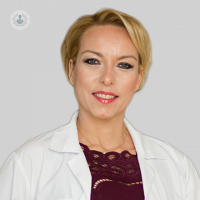Amenorrhoea – why have my periods stopped?
Written by:What causes periods to stop? Top gynaecologist Dr Maria Papadopoulou talks us through the phenomenon known as amenorrhoea.

What is amenorrhoea?
Let’s define what amenorrhoea actually means. Amenorrhoea is when a woman who has already started menstruating – that is, anyone from young women until the age of menopause – suddenly stops having regular periods. There are many stages of amenorrhoea and many ages when amenorrhoea can happen to a woman.
The most important part is to establish the age of the woman suffering from amenorrhoea and after that, to tackle the reason why she’s having amenorrhea and see how we can help her.
What are the causes of amenorrhoea?
There are multiple causes. You first need to establish the age of the person that comes to your office with amenorrhoea. There are three main groups: young girls, middle-aged women, and women that have actually reached menopause.
Let’s start with the younger age group. Amenorrhoea occurs in young girls very often. It happens because sometimes the hypothalamic-pituitary-ovarian axis (the system in the body by which hormones are released from the pituitary gland to stimulate the ovaries) is not sufficiently developed. A young girl can have her first period at around 12 or 13 years old, but after that, she might stop and not menstruate for a couple of years. When the axis has matured, she’ll have her period again.
In women between adolescence and the pre-menopausal stage, there are several possible reasons for amenorrhoea. One is hormonal imbalances. Sometimes, if a woman has polycystic ovarian syndrome, it can cause an excess of androgen, which can lead to amenorrhea. Also, if there is a cyst in the ovaries that produces some hormones that alter the patient’s hormonal balance, then that can cause amenorrhoea.
Sometimes, a woman will have amenorrhoea after pregnancy. This is a serious situation and we need to take an accurate history about when the amenorrhoea started, how long she has been having regular periods, and if she has had abnormal periods at any stage of her life. We need to run the right laboratory tests and an ultrasound.
Then, we have the group of perimenopausal and menopausal women. At some point in a woman’s life, after the age of around 48, she can have irregular cycles; she may go without menstruating for six months, seven months, even up to one year, till the ovaries stop working altogether and she enters the menopausal stage.
Why is there amenorrhoea during lactation?
During lactation, the dominant hormone is progesterone. If you have high progesterone levels and low oestrogen after the birth, the result is not having any period. Keep in mind that having no period doesn't mean you are not fertile. Women that are lactating have to be careful about contraception methods because high progesterone levels may lower the chances of getting pregnant again, but don’t cancel them out completely. Be careful – use contraception if you don’t want to have another pregnancy immediately.
Is there a cure for amenorrhoea?
There are actually many amenorrhoea treatments, depending on the cause. Let’s start with menopausal women. Can we actually restore the period in a woman that’s going through menopause? Yes. How can we do that? We can do that by using hormonal replacement therapy treatments. Nowadays, we can use bioidentical hormone replacement therapy because they are safer and more accurate. What is the difference between the oldest methods of hormone replacement therapy and bioidentical hormone replacement therapy? Bioidentical hormones are just like the hormones that our bodies secrete. These hormones are not harmful because they’re natural; they’re doing the same job and they don’t have side effects.
For pubescent girls, it depends on what caused the amenorrhoea – maybe it’s the maturity of the axis; maybe there’s a cyst; maybe there is a lot of stress. If the patient has an excess of androgen, we can reduce the androgen level during the treatment of contraceptive pills. If they are stressed, then we can give them advice on coping with stress. If their hypothalamic-pituitary-ovarian axis is immature, then we can wait or we can restore the period of a young woman by giving her contraceptive pills to re-balance her menstrual cycle.
There are many other things that cause amenorrhoea in all ages of women: a hormonal imbalance; cysts in the ovaries; or even Kallmann syndrome (a genetic disorder that prevents a person from going through or completing puberty). If the gynaecologist goes deep enough with a good family history, patient history, laboratory tests, and scans, they can find the cause and give treatment accordingly.


